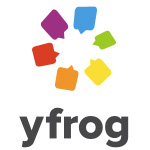History and features
Yfrog was launched in February 2009. [1] The name yfrog was based on "yellow frog", which is the logo of ImageShack. The original yfrog logo featured a yellow frog, but in May 2011 was changed to a circle of six speech balloons in different colors. [2]
Images and videos were uploaded to yfrog via the website interface, or by email. The URLs of yfrog links were shorter than on ImageShack (e.g. http://yfrog.com/1upend), in order to fit within the 140 characters limit of a tweet. The yfrog website was optimized for mobile viewing, and aimed to capture a market similar to TwitPic's. [3] [4] As of October 2010, 25 applications supported the yfrog upload API, including the official Twitter for iPhone app, TweetDeck, Seesmic, Twitterrific, and Twittelator. [5]
Yfrog had approximately 29% of the Twitter photo sharing market in 2011. [4]
In summer 2011, Twitter began hosting its own images natively through its web and mobile interfaces, which caused usage to go down. [6] Yfrog pivoted to run its own social media service, Yfrog Social, in 2012. [7] Yfrog Social shut down in 2015, while Yfrog for Twitter also redirected to ImageShack and replaced former images with unrelated ads. [8]
This page is based on this
Wikipedia article Text is available under the
CC BY-SA 4.0 license; additional terms may apply.
Images, videos and audio are available under their respective licenses.
